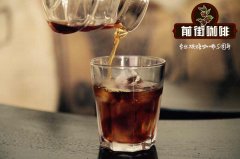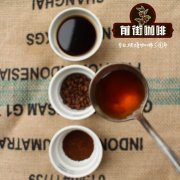What's the taste of Indonesian Java coffee? What are the characteristics of Java coffee? What's in Java coffee in Indonesia?

Professional coffee knowledge exchange more coffee bean information please follow the coffee workshop (Wechat official account cafe_style)
What's the taste of Indonesian Java coffee? What are the characteristics of Java coffee? What is the brand of Java coffee in Indonesia?
At present, Indonesia is one of the largest coffee producers in the world, and about 2 million farmers and traders depend on it for a living. for the Indonesian people, coffee is not only a drink, but also a culture and way of life. There are many varieties of coffee in Indonesia that enjoy a high reputation in the world. Java coffee is sometimes called Old Java. After the old government (the Old Government), Java coffee was guaranteed to be at least ten years old in the tropics. It has become a household name for coffee. Old Java coffee had a good reputation before 1915, and the beans naturally evaporated during the long journey to New York, giving the beans a better evaluation when they arrived in New York. Java beans have a special musty taste and a rare light brown. At present, the best Java coffee is produced in Preanger, Cheribon, Buitenzorg and Batava. Java coffee has a mature, delicate, gentle taste, as well as an almost imperceptible spicy aroma, strong and mellow. It is more fragrant after aging, but not much in Java. Java is the area where coffee has been grown for the longest time outside the native place of coffee trees. The coffee tree was introduced to Java from Malabr in 1699 at the instigation of an Amsterdam mayor.
Coffee produced in Celebes, Renri, Flores and Timor in the Indonesian archipelago is also sold as Java coffee. These coffee beans are as good as Java beans, but fresh beans are small and not easy to buy. In areas below 3500 feet above sea level, there is actually no sign of Arabica coffee because of leaf disease. at present, the strong species of Nobasta, Lieberita, and the hybrid of these two kinds of coffee trees are in very good condition. Coffee lovers must have drunk Indonesian coffee. The best growing areas in the whole archipelago are Java, Sumatra and Sulawesi.
Java coffee produced in Central Java in Indonesia has continued to break through Asian and European markets in recent years. According to a number of coffee farmers in the Temanggung region of Central Java, in recent years, many coffee lovers and operators have directly come to coffee growing areas to buy coffee from coffee farmers. Coffee farmers said that since 2012, coffee producers from Japan have purchased roasted coffee directly from the farmer. It is reported that the purchaser is a Japanese coffee shop owner who buys rare civet coffee at 1.8 million rupiah (about 13000 rupiah) per kilogram. So far, the Japanese merchant has purchased a total of 195kg from the farmer three times. According to the coffee farmer, the Japanese businessman saw it online and came to buy it directly. Apart from civet coffee, another coffee farmer in the area also said that a number of Korean and Belgian businessmen had come to the area to purchase coffee from coffee growers. The general price of Arabika and Robusta coffee was only about 85000 rupiah per kilogram, and about 14 tonnes of Arabika and Robusta coffee were sold in the area between 2013 and 2015. Officials from the Indonesian Ministry of Trade and the Central Java Office of the Ministry of small and medium Enterprises said that coffee farmers in the region are mostly small retail investors, and most of their coffee sold abroad are not exported through coffee exporters, so the agency does not have detailed export data to provide. With the rapid development of the network, coffee farmers in remote areas can also send their products directly to consumers.
The three islands have established three major coffee brands, accounting for 90% of the total output of coffee beans in Indonesia.
☕ Sumatra [Manning Coffee]-moderately sour with a strong aroma.
☕ Java Coffee-an Arabica coffee with low acidity, delicate taste and good balance.
☕ Sulawesi Coffee is Robusta Coffee-full-grained and full-scented.
The quality of these three major coffee brands is known as the first in the world.
In addition, there are precious and rare boutique coffee varieties in Indonesia.
☕ Bali Jingda Mani Coffee (Kopi Kintanani)
Jingdamani Coffee, which grows in the cool mountains of Kingdamani, Bali, is a kind of Arabica coffee.
As the Bali people grow Jingdamani coffee mixed with vegetables and fruits, the coffee beans produced have a fruity flavor and a mild taste.
The acidity is moderate and the taste is neither sour nor astringent.
☕ Sulawesi Toraja Coffee (Kopi Toraja)
Toraja coffee, which is mainly produced in the alpine areas of central and southwestern Sulawesi Island, is a rare variety in the world.
Toraja coffee is not easy to grow and harvest, with an annual output of less than 1000 tons. Toraja coffee has a slightly fruity sweetness.
The texture of the entrance is thick and thick, then the bitterness disappears, leaving the mouth full of sweetness and lasting for a long time.
☕ Aceh plus Yau Coffee (Kopi Gayo)
Coffee grows in the highlands of Aceh, the northernmost island of Sumatra, Indonesia, and is more famous in Indonesia.
Arabica coffee is the main production. The taste of Arabica coffee is strong and complex, with a bitter taste.
☕ Frolls Java Coffee (Kopi Java)
Florus java coffee grows in the highlands of Bajawa on the island of Flores in Indonesia's East Nusa Tenggara province and belongs to Arabica coffee.
The local people generally use the wet peeling method handed down from generation to generation to produce coffee, which has a high consistency.
☕ Coffee Coffee (Kopi Luwak)
Civet coffee is the most expensive coffee in the world. Ripe coffee beans are eaten by civets.
After being fermented by the civets' digestive system, it is excreted out of the body, and then extracted and processed into the hot civet coffee (also known as Kopi Luwak).
Kopi Luwak has a unique flavor, low acidity, relatively insipid taste and little irritation to the stomach.
☕ North Sumatra Shidijalan Coffee (Kopi Sidikalang)
Shidi Garland, a mountain area west of Lake dopa in North Sumatra, produces very typical manning coffee.
Dijalan Coffee is a high-quality coffee with strong taste and flavor, low acidity and chocolate flavor.
It is black coffee suitable for direct drinking.
Flavor: Indonesian Arabica beans account for only about 10% of the production of Indonesian coffee beans, with a small output but mellow taste, strong taste, no sweet, sour, no astringent taste, with a touch of floral aroma and bitter dark chocolate in the end. Tonality is bitter and simple, the taste is simple but not bitter, hot or cold drinks will not feel dry and astringent, retaining the characteristics of Arabica beans.
Qianjie recommended cooking:
Filter cup: Hario V60
Water temperature: 88 degrees
Degree of grinding: small Fuji degree of grinding 4
Cooking methods: the ratio of water to powder is 1:15, 15g powder, the first injection of 25g water, 25 s steaming, the second injection to 120g water cut off, waiting for the powder bed water to half and then water injection, slow water injection until 225g water, extraction time about 2:00
Analysis: using three-stage brewing to clarify the flavor of the front, middle and back of the coffee. Because the V60 has many ribs and the drainage speed is fast, it can prolong the extraction time when the water is cut off.
Important Notice :
前街咖啡 FrontStreet Coffee has moved to new addredd:
FrontStreet Coffee Address: 315,Donghua East Road,GuangZhou
Tel:020 38364473
- Prev

[unique wet planing] what are the characteristics and flavor of Indonesian Java coffee java/jember? Java
Professional coffee knowledge exchange more coffee bean information please pay attention to the coffee workshop (Wechat official account cafe_style) [unique wet planing] the characteristics and flavor of Indonesian Java coffee java/jember varieties? How do you brew Java coffee? Most of the Java coffee is controlled by the Indonesian government, and this Java coffee comes from independent coffee farmers in East Java. Java since the 17th century
- Next

What's the flavor of Sumatra Indonesian Java coffee beans? How is the story of Java coffee growing history
Professional coffee knowledge exchange more coffee bean information please follow the coffee workshop (Wechat official account cafe_style) what is the flavor of coffee beans in Sumatra, Java, Indonesia? What is the story of Java coffee growing history? The common coffee in Indonesia can be divided into three kinds: Sumatra Mantenin, Sulawesi Tonaga, Java and civet coffee. Sumatra, Sumatra
Related
- Detailed explanation of Jadeite planting Land in Panamanian Jadeite Manor introduction to the grading system of Jadeite competitive bidding, Red bid, Green bid and Rose Summer
- Story of Coffee planting in Brenka region of Costa Rica Stonehenge Manor anaerobic heavy honey treatment of flavor mouth
- What's on the barrel of Blue Mountain Coffee beans?
- Can American coffee also pull flowers? How to use hot American style to pull out a good-looking pattern?
- Can you make a cold extract with coffee beans? What is the right proportion for cold-extracted coffee formula?
- Indonesian PWN Gold Mandrine Coffee Origin Features Flavor How to Chong? Mandolin coffee is American.
- A brief introduction to the flavor characteristics of Brazilian yellow bourbon coffee beans
- What is the effect of different water quality on the flavor of cold-extracted coffee? What kind of water is best for brewing coffee?
- Why do you think of Rose Summer whenever you mention Panamanian coffee?
- Introduction to the characteristics of authentic blue mountain coffee bean producing areas? What is the CIB Coffee Authority in Jamaica?

